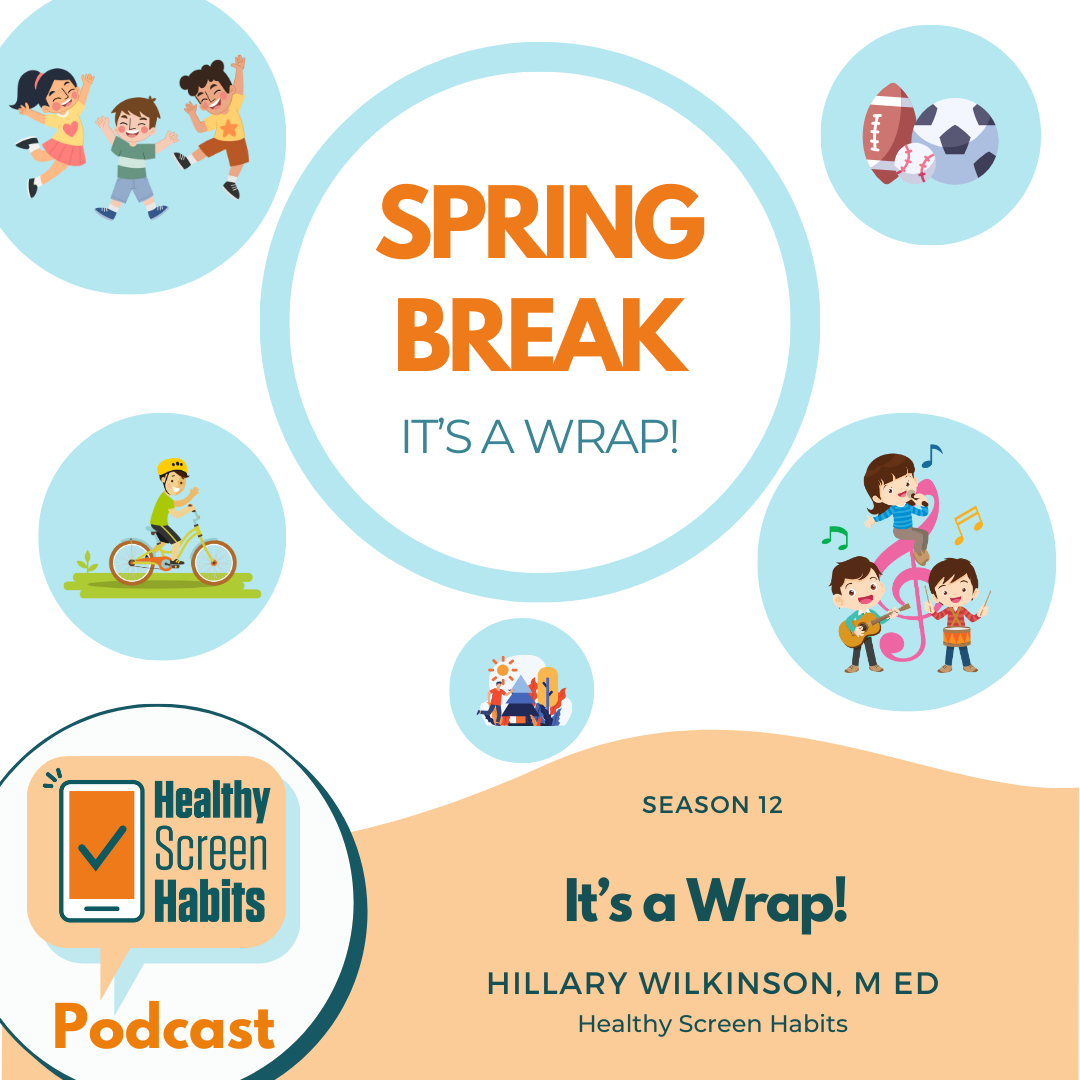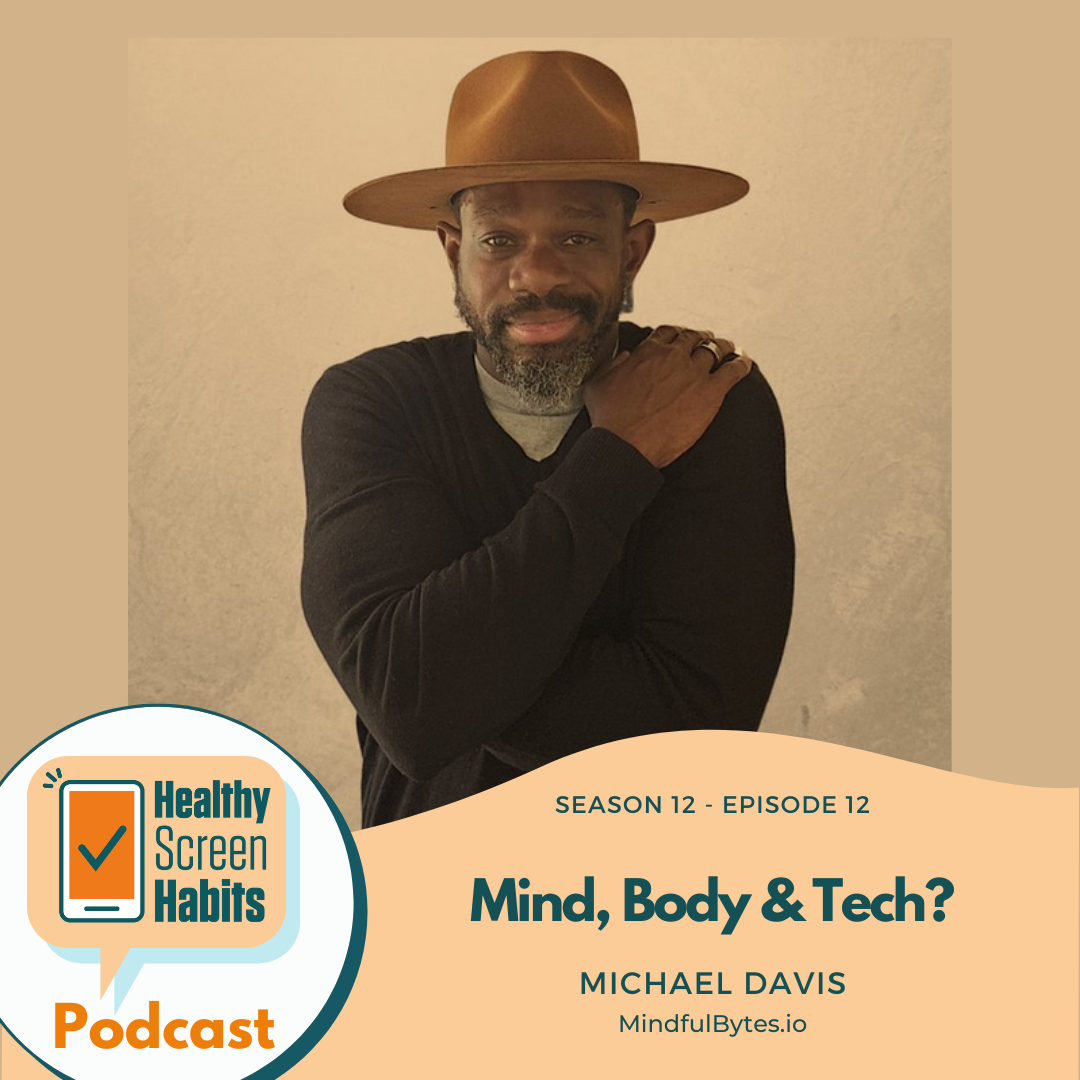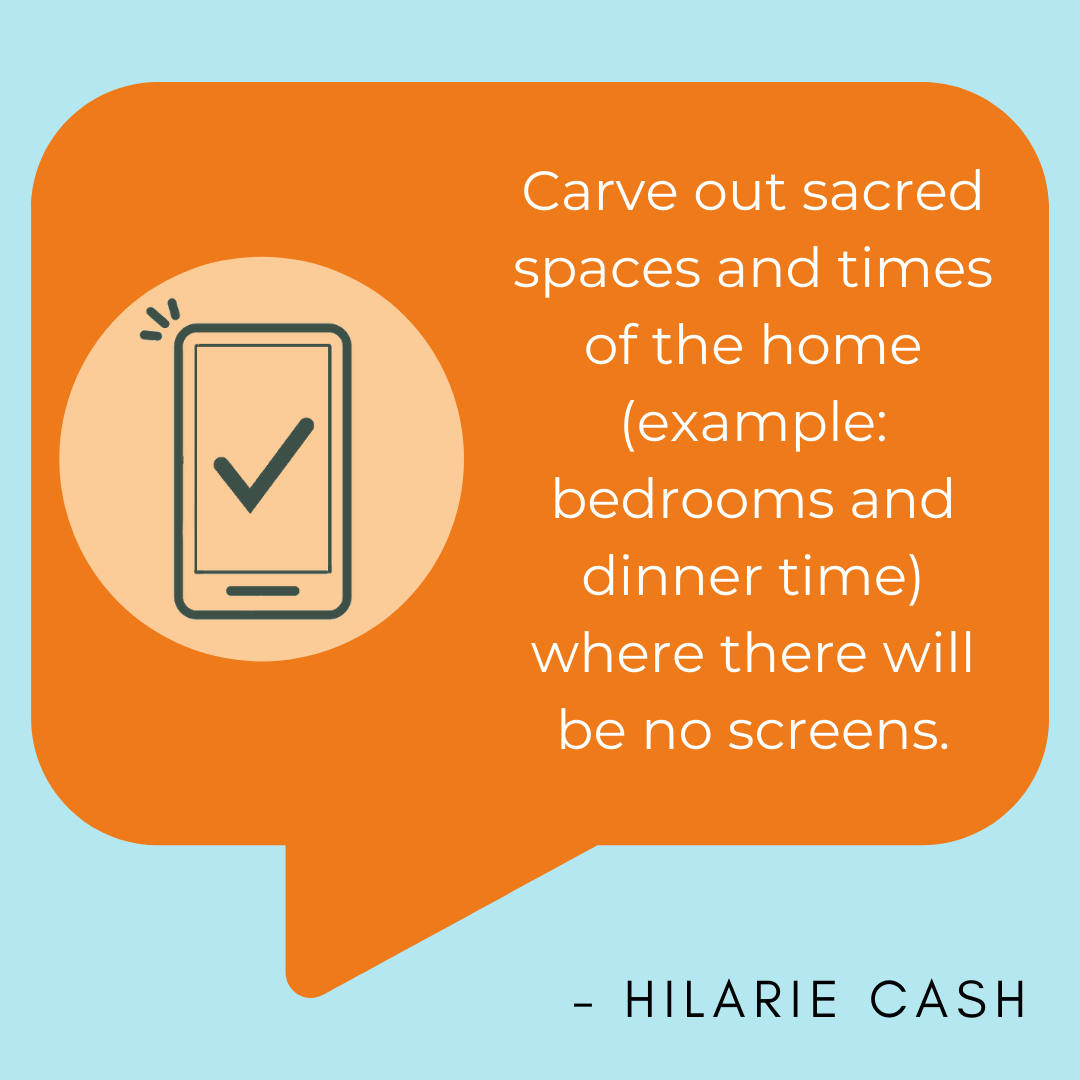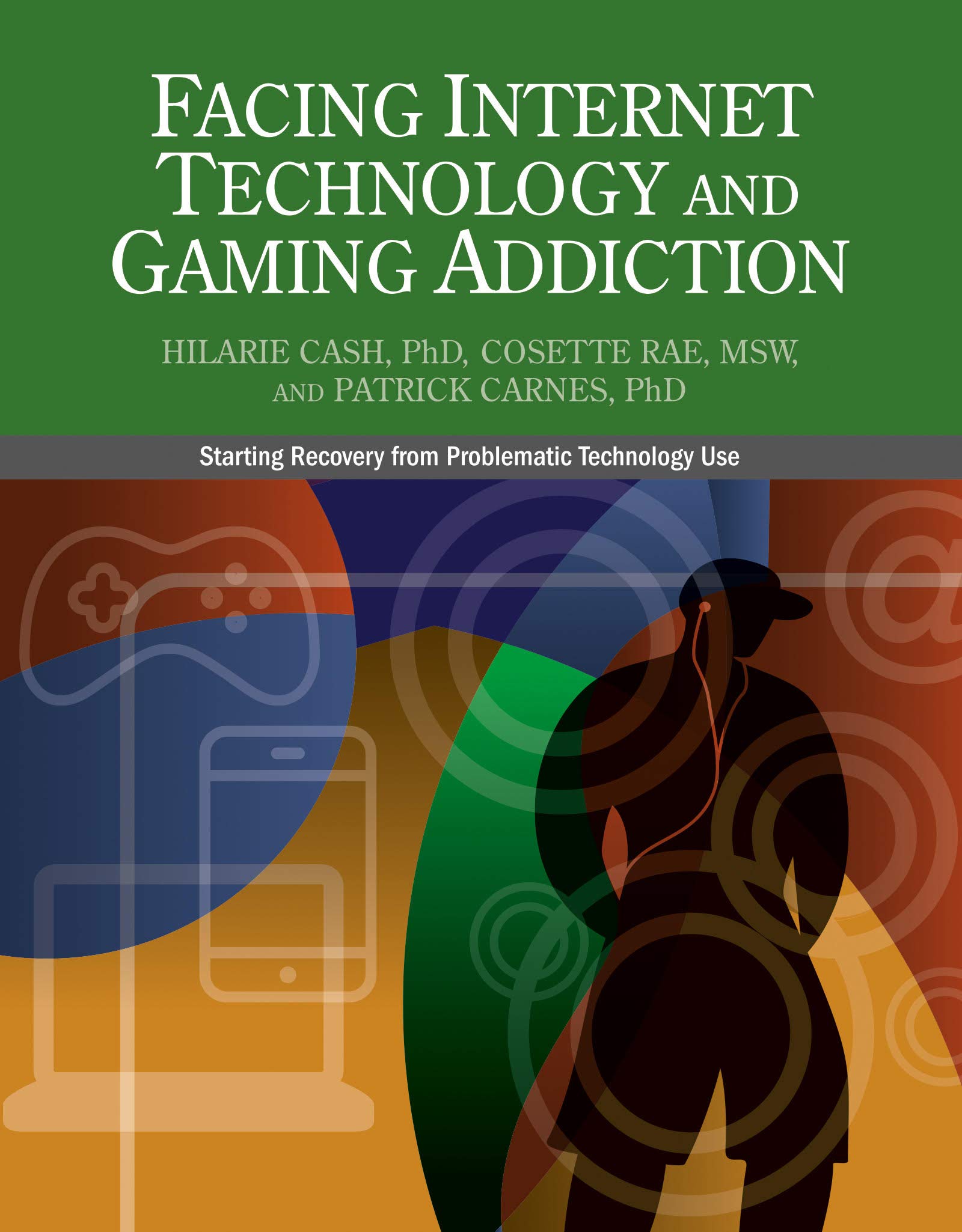Episode 11: Recognizing Gaming Addiction // Hilarie Cash of ReStart Life
Hosted by Hillary Wilkinson
"Addiction is all about immediate gratification."
- Hilarie Cash
Hilarie Cash is a pioneer in the field of digital addiction and one of the nation’s leading clinical experts in internet and gaming disorders. As a co-founder and Chief Clinical Officer of ReStart Life, the first of its kind residential treatment facility in the U.S. and Canada, she has been studying technology and its effects upon mental health since the 1990’s.
Learn how to recognize problematic behaviors and when to ask for help by listening to this episode.
Healthy Screen Habit Takeaway
For more information:
Website: https://www.restartlife.com
ReStart Phone number: (800) 682-0670
Resources Referenced:
Show Transcript
Hillary Wilkinson (00:02):
It's not often that you get to sit and chat with someone who is truly a pioneer in their field. And today I get to do that. My guest today is the OG Dr. Hillary Cash, someone whom I was immediately drawn to by her fabulous first name. She's been in the field of behavioral issues surrounding internet and gaming since the 1990s. And is one of the masterminds behind a program called ReStart Life, which is a residential program. The first of its kind in the U S or Canada that is designed explicitly for adolescents and adults who are experiencing addiction to the internet and video games, as well as other mental health problems, Restart has worked with some of the best gamers and influencers in the world. I could not be more honored to introduce to the healthy screen habits, podcast, Hillary Cash.
Hilarie Cash (01:09):
It's such a pleasure to be here with you.
Hillary Wilkinson (01:10):
Thank you. So Hillary, I love the mission of Restart, which is stated to help those in need develop a healthy, balanced relationship to digital technology. Part of the reason why I love it is because it focuses on balance. It doesn't come across as being anti-technology. And that being said, could you illustrate, what does a balanced relationship to digital technology look like? We're surrounded. Yeah.
Hilarie Cash (01:46):
Right, right. So we all need to use computers. There's just no escaping it. Um, so a balanced use of it means that we are able to keep our in mind what all the priorities are that we all need as human beings in order to be healthy and making those priorities, uh, keep, you know, able to act on those and make those things priorities. So if you think in terms of a 24 hour period, we all need sleep. So you would block out an adequate amount of sleep. Um, we all need to get our work done, whatever that work is. So we need to block that time out. We all need exercise in some form, we need to be social. We are social animals. We suffer if we're not social in some way during time of COVID, that might mean zoom calls with friends and family, or if we can do it in person that's ideal. Um, we need to really feed our and nourish our bodies. We need, um, you know, to take our showers and brush our teeth we need, and we need some play in our lives. And we probably need time for reflection. All of these are things that really all humans need. Ideally,
Hillary Wilkinson (03:23):
I'm almost picturing this like pie chart as you, as you block out these things, I can almost like visualize, and I must admit, it seems as I get older, the sleep part gets a bigger and bigger piece of my pie,
Hilarie Cash (03:38):
Which is because your body needs it. Right. Right. Right. And, and so it's respond. It's, it's really understanding what we need and being able to provide for ourselves what we need and understanding that using the internet and computers for entertainment really probably needs to be at the bottom of that list of priorities, thin slice of pie. Because if that slice of pie starts growing the way you were describing the sleep wedge growing, if that thin slice is growing, it's squeezing out these other things that we actually do need. And so that's, that's what it means to live a healthy, balanced life that our tech use will be there, but it will be there in moderation and all of these other things we will be prioritizing.
Hillary Wilkinson (04:40):
So just out of curiosity, do you find that these pieces of pie T to use the, to use the visualization that I'm going off of? Are they individual like, I mean, can they be, I see what you mean about, everybody's got their own slices, but do some people need more of like a bigger slice than others,
Hilarie Cash (05:05):
A bigger slice of any particular thing? Of course, it's all individualized, uh, you know, teenagers need what, nine to 10 hours of sleep as do babies and toddlers. Right? So, and, and, and young children shouldn't have access to screens at all. Ideally. Um, so yes, it all, it's, it, it all is an individualized pie, right. But one of the things that's so important for parents to understand is that screens are mesmerizing and they are designed to be mesmerizing. And so, because of that, they will override even for an adult, they can override this. And for children, absolutely. They override a child's natural urges children. Naturally, if there's no screen around to mesmerize them, children will explore. Their environment will be drawn to interactions with people will be creative in their play, uh, will want to be outdoors in nature. All of these things children naturally want to do.
Hilarie Cash (06:23):
And it, these are things children need to do to develop in a healthy, normal way, but the screens will inter 10 easily interfere with that. Certainly. And so ideally, you'd keep your kids away from screens up until they're at least six years old, because those first six years are the years when the foundation for everything that follows is laid down and chill. And, and this means that parents have to also be very careful about their own screen use, because if a parent is mesmerized on, you know, on Facebook or mesmerized on playing some game and not paying attention to the child who does not have a screen, and the child wants your attention, the child needs your attention. That's not going to work either. So parents really need to just understand what children need developmentally and understand how easy it is for screens in the hands of parents or children, caregivers, or children can actually interfere with what they need. Okay.
Hillary Wilkinson (07:28):
Overwhelm those natural urges. Yeah. I think that's critical. So the flip side of that balanced relationship with the individual pieces of pie with the relationship with technology is going to be clearly an unbalanced. And is there, like in your experience, is there a recognizable tipping point at which people need to pursue help with getting their managing their digital life?
Hilarie Cash (08:01):
That's a great question. So the World Health Organization, which has recognized gaming disorder as, as an addictive disorder, says basically three things. And these are things that apply to all addiction. That first of all, the individual has lost control. They aren't in control of .....fill in the blank,
Hillary Wilkinson (08:30):
Somebody who's right. So that's somebody who's no longer maybe listening to the biological urges of, of needing to eat or hydrate, or even use the restroom.
Hilarie Cash (08:42):
Right. Right. All right. So they've lost control and they often try to regain control and can't, so they've lost control that, that thing that screen, in this case, we're talking about screens and the internet that screens in the internet have, are taking priority over everything else. Oh, okay. And there, they become the top priority over everything else. And, and lastly that the person continues with their screen use in spite of the negative consequences. All right. So for a teenager, the negative consequences might be, they're not getting enough sleep. It might be that their schoolwork is suffering and it might be that they're constantly fighting with their parents. It might be that they're starting to steal from their parents in order to purchase what they want for their games and so forth. And that in spite of those negative consequences, they continue with their gaming or porn use or social media use or whatever they're doing. Right. And so that's, so any time any of those things are showing up, that's it, it's important to take corrective action. If any one of those things is you can recognize in yourself or someone else, it's time to take corrective action.
Hillary Wilkinson (10:14):
Okay. Super important points. Thank you. And when we come back, we're going to get into some more of those recognizable points.
Ad Break
Hillary Wilkinson (10:38):
I'm speaking with Dr. Hillary Cash, the co-founder and Chief Clinical Officer of ReStart a digital addiction treatment facility located in Bellevue Washington. She's coauthored, several peer reviewed journal articles and a workbook to be published by the International Institute of Trauma and Addiction Professionals in May, 2021. We're talking about digital behavioral patterns, which have potential to become problematic over time in talking about behaviors. Let's go back just a little bit and we're, and I'd like to ask, you know, start by recognizing the people behind the behavior. So I kind of want to like, just get a little lens on that. And could you share, do you have any basic demographics or characteristics about people who come to restart?
Hilarie Cash (11:32):
Well, yes, but I, I want to say that, uh, people struggling with their screen use are in cover. It covers all demographics. All right. So there's, there's no part of the American population is immune, which is escaping this because wherever there's a screen and the internet that you're going to find problems now, restart is going to have a rarefied sub group in the population because people have to afford coming to us and it's insurance doesn't cover this sort of thing. And so it's not going to, so people have to pay out of pocket. So it means that people have to be of means in order to come to us, that said, uh, our population tends to be there for, uh, middle or upper middle class. Uh, it's certainly predominantly white. Um, the it's mostly men and they tend to be, uh, very bright young men who have in the adult program. They've all failed out of college in the adolescent program. They are starting to fail at their, their middle and high school work,
Hillary Wilkinson (12:58):
Hitting those tipping points that you were talking about earlier. Yeah. Do you have openings in your program for neurodiverse clients?
Hilarie Cash (13:05):
We do. And about a third, I would say are neuro diverse. Um, they tend to be high functioning. We're not set up for, uh, lower functioning folks on the autism spectrum in particular, but we have many, many clients who have traits and sometimes the full diagnosis of being on the autism spectrum. And that's fine. As long as they can function within the program, we've designed, it works great for them.
Hillary Wilkinson (13:38):
Wonderful. Wonderful.Can you talk about some of the primary skills or coping measures that are taught within your program?
Hilarie Cash (13:54):
When people come here, they are usually depressed and anxious
Hilarie Cash (14:02):
That's because they have lost their, whatever confidence they had in themselves. Uh, socially, they have been so isolated that they have lost whatever confidence they had and often they just have not developed good social skills. So teaching them good social skills is very, very important. They have also as addicts, uh, people who have used escapism as a coping for difficult emotions.
Hillary Wilkinson (14:40):
So they have self isolated,
Hilarie Cash (14:42):
They've self isolated, but also they just have distracted themselves rather than really dealing with, let's say angry about something, rather than learning the skills to effectively deal with their anger, deal with conflict. They have just avoided it escaped into gaming or whatever they do online. And in that way, they kind of manage their emotions, but it's not healthy management. So we teach emotion, regulation skills. We do that in a variety of ways. That includes mindfulness training. Uh, we teach communication skills, social skills, emotion, regulation, skills, uh, executive functioning skills. They no matter who they are, most of them, uh, the majority for sure, don't have well developed executive functioning skills.
Hillary Wilkinson (15:45):
Can you define what those are? What are executive functioning skills?
Hilarie Cash (15:49):
They are the skills of planning, organizing, um, control. Self-control like holding back. Let's say I feel the urge to game, but I can stop myself because I can think about it. I, I can think rationally and think that's really not a good idea. I'm not going to do it. Even though I feel the urge to do it. That's an executive functioning skill.
Hillary Wilkinson
(16:19):
So delayed gratification would fall into that.
Hilarie Cash (16:23):
Yes, absolutely. Thinking ahead, planning ahead. Those are our very typical executive functioning skills. So all addicts tend to have poor, um, ability to delay gratification. Addiction is all about immediate gratification. So we work a lot on that, those skills. And then we also just are working on a work ethic, you know, which is related to that, the ability to just get something done, even though you're not having fun at it, but it's important to do. It's a responsibility. Uh, and so we work on that and that's trying to develop healthy habits. We teach them how to cook. If they don't know how to cook, how to do their laundry, if they don't know how to do their laundry,
Hillary Wilkinson
(17:18):
I was just going to ask, where do chores fit in with all of this kind of bringing it home into our own homes and our listeners homes? Is that, would you say that that's, it's kind of that community building that team building of everyone contributing and raising competence levels of skill building, which then leads to confidence?
Hilarie Cash (17:42):
Absolutely. Because each new skill, they learn builds their confidence.
Hillary Wilkinson (17:50):
Right? That's path through kind of to gain that, that path through that self isolation and hopefully make some connections.
Hilarie Cash (17:58):
Okay. And when they finish in our intensive program, which is three months long, they, by the time they finish that program or, or are nearing the end of that, they have developed a plan. We call it the life balance plan. And it's really a blueprint for how they're going to reconnect with technology going forward. And they, um, the majority of them go into our transition program and in our transition program, they start using computers in our computer lab and they are now it, and again, they're learning new habits, right? The habit of using a computer as a tool, rather than a source of entertainment, rather than a sort of escapism from uncomfortable feelings. And so they're getting jobs, part-time jobs. So they're learning all the skills around that, you know, how do you create a resume? How do you go into an interview? Right. You know, how developing the habit of getting up on time and going to bed on time and, you know, things like that.
Hillary Wilkinson (19:07):
Right. So knowing that that's kind of the skill building that you do in treatment. Let's spend some time talking a little bit about preventative measures at home. So let's do goal is I always say that, you know, the goal is obsolescence within this field. Right. I think, I think you and I share that goal. Yes. Um, so internationally, I understand that Korea is far ahead of the game for, with screening for internet addiction happening as early as age 10 and centers for recovery sponsored by the government around the country. So I speak with many parents and of course our goal is never to have a tech addicted child. So I'm kind of am asking like, how do we avoid this? What are antidotes to too much time online? I think the skill building with your talked about, like, we talked about the chores, the executive function, and I'm kind of interested what I'm gearing this towards selfishly is, um, I know that Restart is centered in a very beautiful place. And I'm wondering what part does nature play?
Hilarie Cash (20:28):
An important role.
Hillary Wilkinson (20:30):
Can you talk about that a little bit as well as, as well as antidotes to too much time online, I was a kind of a, kind of a mishmash question there, sorry.
Hilarie Cash (20:42):
Um, there's lots of research about how as, as animals and part of nature, we thrive with contact. When we have contact with nature, we need contact with nature and we are, we suffer when we live in the urban jungle without any contact with nature. We, we do not thrive if we spend all of our lives indoors, even if there's wonderful, natural opportunities outside, you know, children these days are spending not just because of COVID pre COVID spending their time indoors rather than outdoors. So outdoors provides a great opportunity, not just to relax. There's good evidence that it improves attention span. It, it lowers stress. It helps people cope, contact with nature helps people cope. And so, uh, when they come to the adult program, their first, uh, in a setting that's called the ranch where they have to take care of animals and it's surrounded by trees and they're in nature there. And then when they move on to Pathways, they're in another setting where it's, it's like a park full of beautiful trees and paths through the, through those trees.
Hillary Wilkinson (22:06):
It almost sounds like summer camp.
Hilarie Cash (22:09):
Exactly. And the kids, when the kids come to Serenity Mountain, it is on a bluff that overlooks the cascades. It's 32 beautiful acres of land with, with an Island in a river and paths that are, you know, it's just completely gorgeous, magical.
Hillary Wilkinson (22:26):
It is. And so
Hilarie Cash (22:28):
Their contact with nature is helping keep them calm, helping them, uh, teaching them to go for a walk when they're upset, go for a walk, get out into nature, teaching them,
Hillary Wilkinson
(22:41):
Um, some of those coping skills rather than that numbing of grabbing the device. Exactly. Great. Um, can you share some of the recovery rates of your program?
Hilarie Cash (22:55):
Yes. The adolescent program is the only one where I've done a little bit of pretty informal, but nonetheless, I think useful, uh, research where I sent out to parents for the I, and I heard back from half of them. I sent out to parents, just four questions and their kids had to have been out of the program for at least four months. And I asked, how was your on a scale of zero to five? How was your kid's, uh, internet, uh, behavior before Restart and how is it now? And then how was your kid's overall global functioning before Restart and how has it now? And the before Restart questions all got zero and the, after got a 4.1 and a 4.2. Wow. So that's pretty good. Um, that's really good. So I think, uh, I think we're probably, if we were doing that long-term outcome research with our adults, we'd probably find, I hope we would find similar results.
Hilarie Cash (24:06):
Um, what we do know is that about 70% go into the transition program from the intensive, and we know that about, about 75% or 65% maybe graduate out of that transition program, uh, with, without our approval. In other words, they've succeeded. Okay. Doesn't mean they haven't stumbled. It doesn't mean they haven't had relapses or lapses. We're all on a journey. We're all on a journey and, and they have succeeded in that journey and that if they come into the transition programs, it means they're with us usually for about a year, anywhere from nine months to a year. And so I think those who go into the transition program do tend to be very successful long-term
Hillary Wilkinson (25:00):
Yes. Okay. Well, thank you. When we come back after this break, I'm going to ask you for one healthy screen habit.
Ad Break
Hillary Wilkinson (25:12):
We're back, I'm talking with Hilarie Cash guru and one of the nation's leading clinical experts in the growing field of internet and gaming disorders. On every episode of the healthy screen habits podcast, I ask for one healthy screen habit that our listeners can put into practice in their own home. Do you have one?
Hilarie Cash (25:45):
Yes. Um, I, there are a bunch of course, but just for one. So I think one that is probably easier than many to Institute would be carving out kind of sacred places in the home and times in the home where there will be no screens. So I recommend no screens of any sort, including television screens in bedrooms. I recommend, uh, no screens at the dinner table. Those would just be some examples. I think if, if everyone in the family can get used to having those times in places without screens, they might balk at it at first, but once they get into the habit of it, I think they will all appreciate it.
Hillary Wilkinson (26:33):
I agree. And if any of our listeners are looking to start that journey, I'm just going to reference on our website. We have a family tech plan, which is a free downloadable tool, and it serves as a conversation springboard to start some of these practices. And that is one of them. So I am feeling very proud of us that we share the same, same recommendation that you do. Okay. If you feel like you would like to take a closer look at restart, or maybe have a peak at Dr. Hillary Cash's new workbook Facing Internet Technology and Gaming Addiction; A Gentle Path to Beginning Recovery From Internet and Video Game Addiction. Please check out this episode's show notes by going to HealthyScreenHabits.org, click on the podcast button and find Episode 11, Hillary. Thank you so much for being here today.
Hilarie Cash (27:35):
It has been my absolute pleasure. Thank you for inviting me. Thank you. Okay.
About the podcast host, Hillary Wilkinson
Hillary found the need to take a big look at technology when her children began asking for their own devices. Quickly overwhelmed, she found that the hard and fast rules in other areas of life became difficult to uphold in the digital world. As a teacher and a mom of 2 teens, Hillary believes the key to healthy screen habits lies in empowering our kids through education and awareness.
Parenting is hard. Technology can make it tricky. Hillary uses this podcast to help bring these areas together to help all families create healthy screen habits.
Recent Episodes


Contact Info
Email:
info@healthyscreenhabits.org
Mailing address:
144 W. Los Angeles Ave. #106-362, Moorpark, CA 93021
All Rights Reserved | Healthy Screen Habits is a registered 501(c)(3) nonprofit






